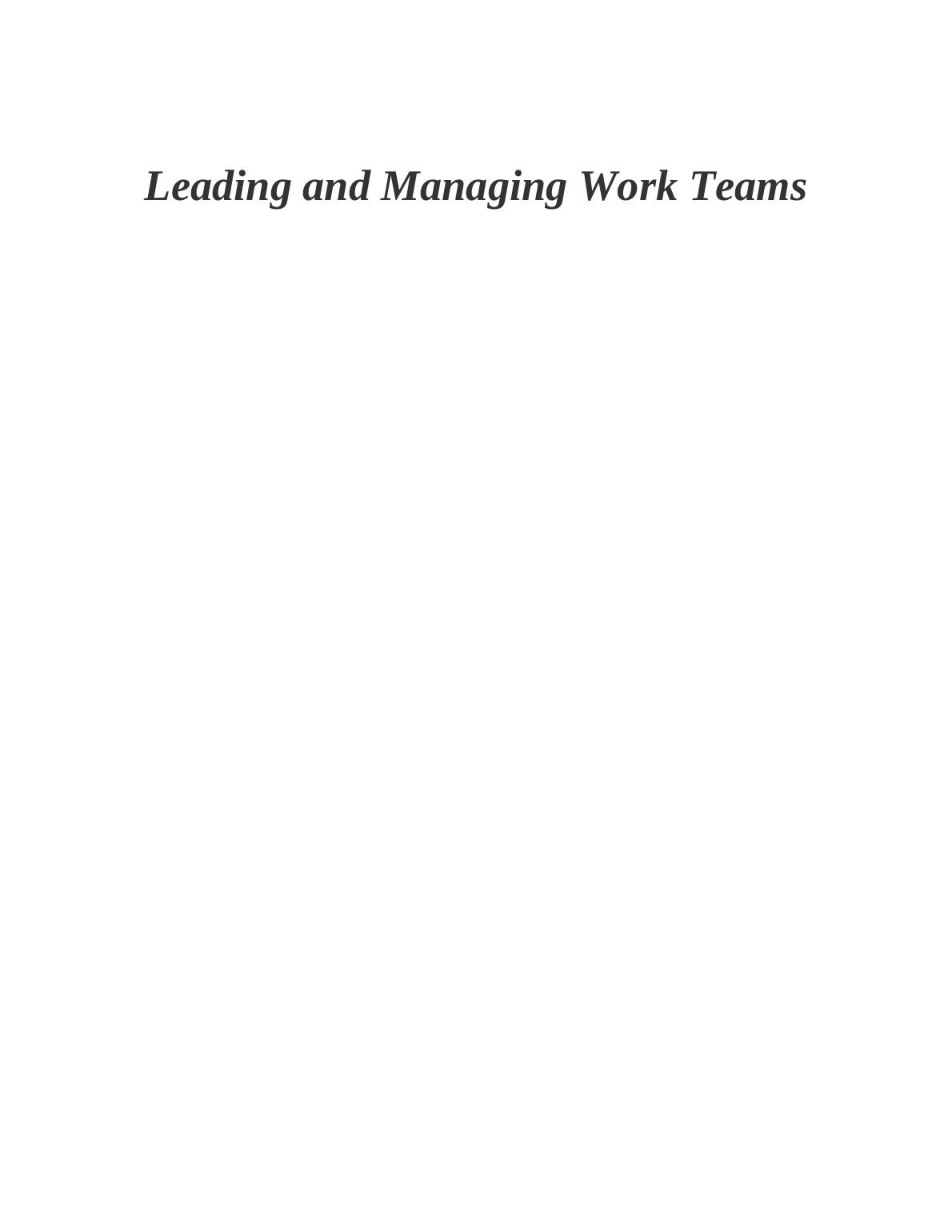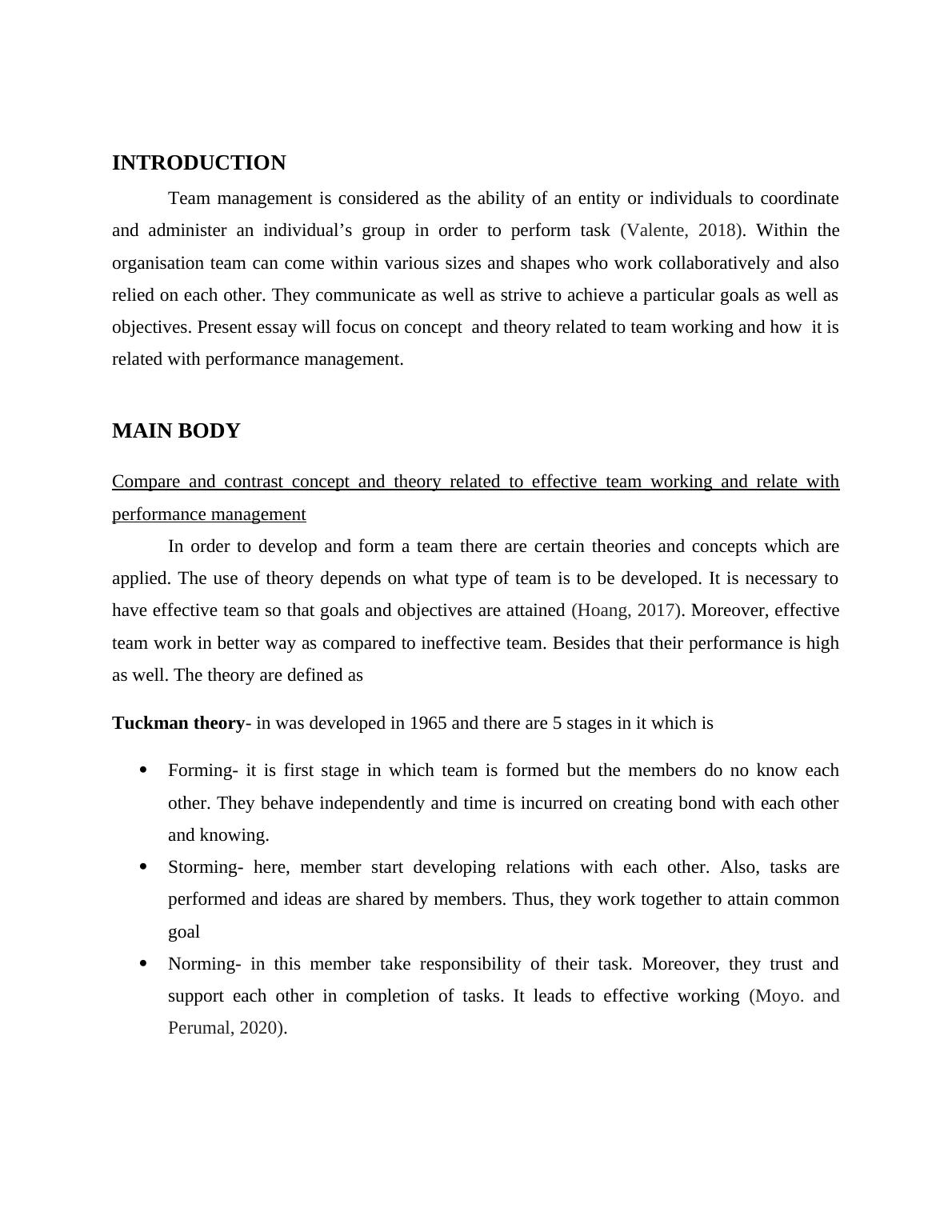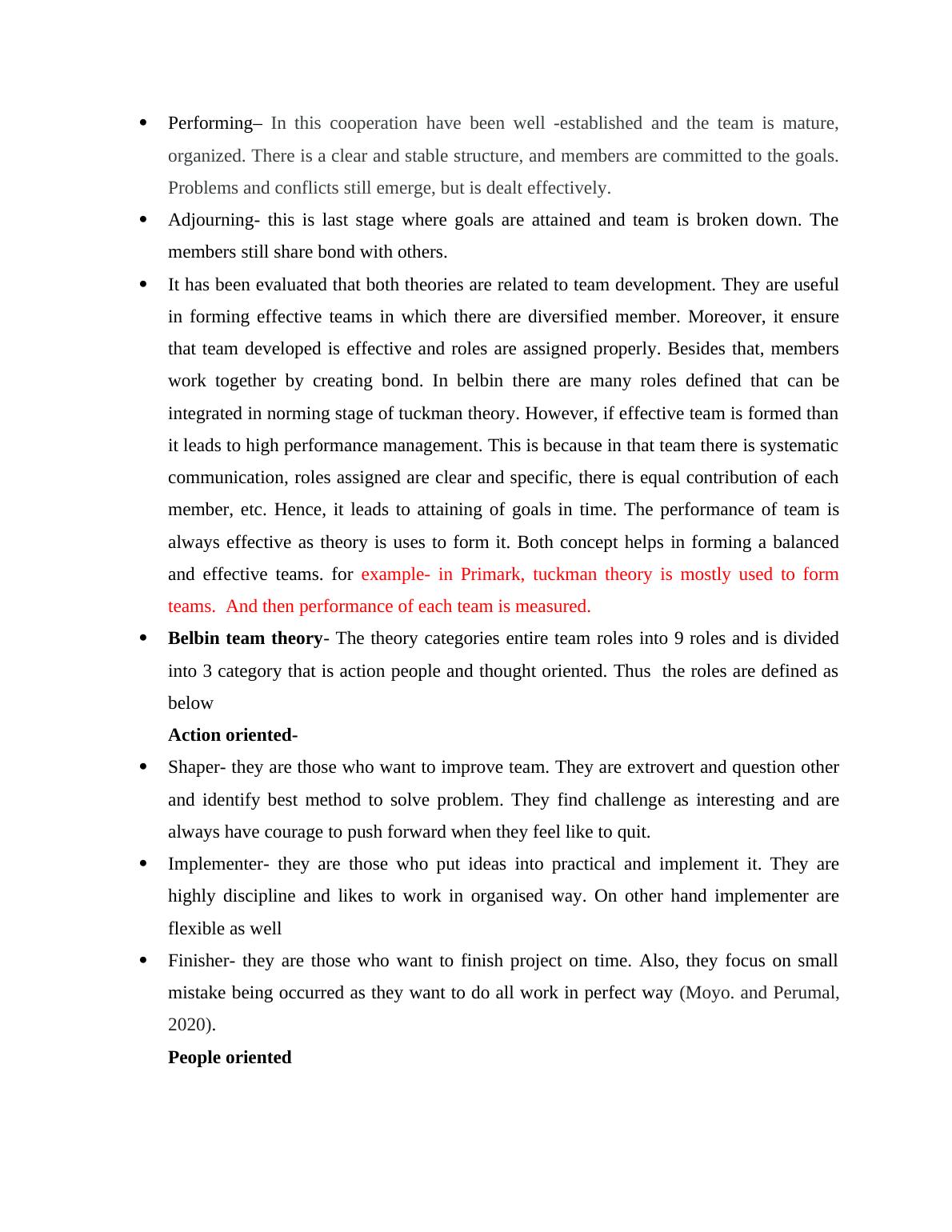Leadership Styles and Skills
Added on 2023-01-04
9 Pages2698 Words47 Views
Leading and Managing Work Teams

INTRODUCTION
Team management is considered as the ability of an entity or individuals to coordinate
and administer an individual’s group in order to perform task (Valente, 2018). Within the
organisation team can come within various sizes and shapes who work collaboratively and also
relied on each other. They communicate as well as strive to achieve a particular goals as well as
objectives. Present essay will focus on concept and theory related to team working and how it is
related with performance management.
MAIN BODY
Compare and contrast concept and theory related to effective team working and relate with
performance management
In order to develop and form a team there are certain theories and concepts which are
applied. The use of theory depends on what type of team is to be developed. It is necessary to
have effective team so that goals and objectives are attained (Hoang, 2017). Moreover, effective
team work in better way as compared to ineffective team. Besides that their performance is high
as well. The theory are defined as
Tuckman theory- in was developed in 1965 and there are 5 stages in it which is
Forming- it is first stage in which team is formed but the members do no know each
other. They behave independently and time is incurred on creating bond with each other
and knowing.
Storming- here, member start developing relations with each other. Also, tasks are
performed and ideas are shared by members. Thus, they work together to attain common
goal
Norming- in this member take responsibility of their task. Moreover, they trust and
support each other in completion of tasks. It leads to effective working (Moyo. and
Perumal, 2020).
Team management is considered as the ability of an entity or individuals to coordinate
and administer an individual’s group in order to perform task (Valente, 2018). Within the
organisation team can come within various sizes and shapes who work collaboratively and also
relied on each other. They communicate as well as strive to achieve a particular goals as well as
objectives. Present essay will focus on concept and theory related to team working and how it is
related with performance management.
MAIN BODY
Compare and contrast concept and theory related to effective team working and relate with
performance management
In order to develop and form a team there are certain theories and concepts which are
applied. The use of theory depends on what type of team is to be developed. It is necessary to
have effective team so that goals and objectives are attained (Hoang, 2017). Moreover, effective
team work in better way as compared to ineffective team. Besides that their performance is high
as well. The theory are defined as
Tuckman theory- in was developed in 1965 and there are 5 stages in it which is
Forming- it is first stage in which team is formed but the members do no know each
other. They behave independently and time is incurred on creating bond with each other
and knowing.
Storming- here, member start developing relations with each other. Also, tasks are
performed and ideas are shared by members. Thus, they work together to attain common
goal
Norming- in this member take responsibility of their task. Moreover, they trust and
support each other in completion of tasks. It leads to effective working (Moyo. and
Perumal, 2020).

Performing– In this cooperation have been well -established and the team is mature,
organized. There is a clear and stable structure, and members are committed to the goals.
Problems and conflicts still emerge, but is dealt effectively.
Adjourning- this is last stage where goals are attained and team is broken down. The
members still share bond with others.
It has been evaluated that both theories are related to team development. They are useful
in forming effective teams in which there are diversified member. Moreover, it ensure
that team developed is effective and roles are assigned properly. Besides that, members
work together by creating bond. In belbin there are many roles defined that can be
integrated in norming stage of tuckman theory. However, if effective team is formed than
it leads to high performance management. This is because in that team there is systematic
communication, roles assigned are clear and specific, there is equal contribution of each
member, etc. Hence, it leads to attaining of goals in time. The performance of team is
always effective as theory is uses to form it. Both concept helps in forming a balanced
and effective teams. for example- in Primark, tuckman theory is mostly used to form
teams. And then performance of each team is measured.
Belbin team theory- The theory categories entire team roles into 9 roles and is divided
into 3 category that is action people and thought oriented. Thus the roles are defined as
below
Action oriented-
Shaper- they are those who want to improve team. They are extrovert and question other
and identify best method to solve problem. They find challenge as interesting and are
always have courage to push forward when they feel like to quit.
Implementer- they are those who put ideas into practical and implement it. They are
highly discipline and likes to work in organised way. On other hand implementer are
flexible as well
Finisher- they are those who want to finish project on time. Also, they focus on small
mistake being occurred as they want to do all work in perfect way (Moyo. and Perumal,
2020).
People oriented
organized. There is a clear and stable structure, and members are committed to the goals.
Problems and conflicts still emerge, but is dealt effectively.
Adjourning- this is last stage where goals are attained and team is broken down. The
members still share bond with others.
It has been evaluated that both theories are related to team development. They are useful
in forming effective teams in which there are diversified member. Moreover, it ensure
that team developed is effective and roles are assigned properly. Besides that, members
work together by creating bond. In belbin there are many roles defined that can be
integrated in norming stage of tuckman theory. However, if effective team is formed than
it leads to high performance management. This is because in that team there is systematic
communication, roles assigned are clear and specific, there is equal contribution of each
member, etc. Hence, it leads to attaining of goals in time. The performance of team is
always effective as theory is uses to form it. Both concept helps in forming a balanced
and effective teams. for example- in Primark, tuckman theory is mostly used to form
teams. And then performance of each team is measured.
Belbin team theory- The theory categories entire team roles into 9 roles and is divided
into 3 category that is action people and thought oriented. Thus the roles are defined as
below
Action oriented-
Shaper- they are those who want to improve team. They are extrovert and question other
and identify best method to solve problem. They find challenge as interesting and are
always have courage to push forward when they feel like to quit.
Implementer- they are those who put ideas into practical and implement it. They are
highly discipline and likes to work in organised way. On other hand implementer are
flexible as well
Finisher- they are those who want to finish project on time. Also, they focus on small
mistake being occurred as they want to do all work in perfect way (Moyo. and Perumal,
2020).
People oriented

End of preview
Want to access all the pages? Upload your documents or become a member.
Related Documents
Organisational Behaviour: Tuckman's Theory and Conflict Managementlg...
|13
|3230
|46
Benefit of Team Workinglg...
|5
|877
|46
Communication within the Workplace: Applying Relevant Theorylg...
|10
|3013
|178
Assignments on Teams and Teamworklg...
|9
|2660
|424
Effective Team Working and Communicationslg...
|8
|2667
|428
Individual Paper based on group project - Principles of Managementlg...
|8
|2304
|273